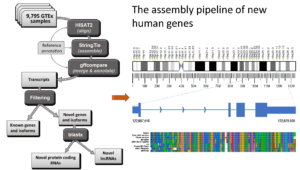Bio
“Towards a New Comprehensive Human Gene Catalogue”

Mihaela Pertea is an Associate Professor in the Department of Biomedical Engineering at Johns Hopkins University. She received her B.S. and M.S. degrees in Computer Science from University of Bucharest in Romania, and her Ph.D in Computer Science from the Johns Hopkins University School of Engineering. Dr. Pertea’s work in computational biology draws upon techniques and data from multiple disciplines, including computer science and molecular biology, genetics, biotechnology, and statistics. Her work has focused on computational gene finding and sequence pattern recognition and she has developed several open-source gene finders that were used for the annotation of the genomes of Plasmodium falciparum (malaria parasite), Arabidopsis thaliana, rice, Aspergillus fumigatus, Cryptococcus neoformans, and others. A major focus of her current research is on developing innovative and efficient methods to analyze large DNA and RNA sequence data in order to provide a genome-scale understanding of cellular function. Dr. Pertea believes that the principled use of algorithms from other fields, adapted to the problems of computational biology and coupled with careful software engineering and high performance computing, has the potential to make a significant impact in the life sciences. She has published over 50 scientific papers that have received more than 30,000 citations to date.
To join the live event please request the link by emailing: icm@jhu.edu
▶RECORDING
Abstract
“Towards a New Comprehensive Human Gene Catalogue”

A huge and still-growing number of genetic studies depend on the human gene catalogue, including thousands of experiments each year and an enormous investment of time and effort. However, despite its critical role in biomedical research, the human gene list is still incomplete and, in many ways, unstable. The widespread use of RNA sequencing technology over the past decade has allowed scientists to discover a far larger and richer repertoire of genes and transcripts than previously known. Our own recent efforts led to the creation of a new human gene catalogue, called CHESS, that we built using a very large collection of nearly 10,000 RNA-seq experiments from 31 tissues, all sequenced as part of the GTEx project. Processing this large amount of data was one of the most challenging tasks, made possible by the computational efficiency of StringTie, a transcriptome assembler we developed in our lab.
▶RECORDING